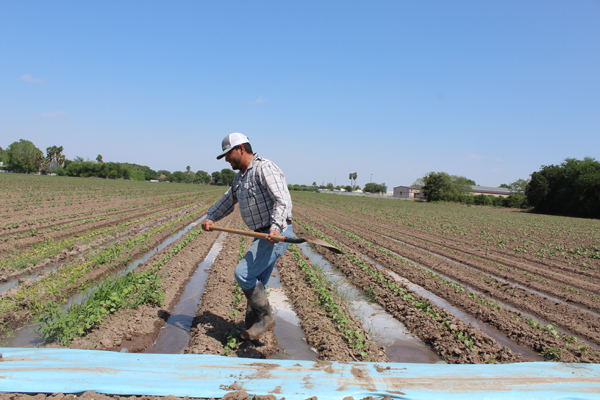- La Feria Community Holds Succesful Business Mixer Event
- Little Nashville to Take Place in Downtown Mercedes
- Lions Basketball Captures District Gold
- La Feria ISD Students Compete in Regional Chess Tournament
- Lions End First Half of 32-4A on a High Note
- La Feria ISD Held Another Successful Parent Conference
- Strong Appearance for Lions at Hidalgo Power Meet
- LFECHS Students Get to Meet Local Actress
- Students Participate in Marine Biology Camp
- Two LFECHS Students Qualify for All-State Band
Farmers Facing Tough Year Due to Dry Weather Conditions
- Updated: April 13, 2018
by Tony Vindell/LFN
Farming has always been an unpredictable business but, in the words of a producer, they have to do the best they can.
Fields planted with some of the major crops in the Rio Grande Valley have been getting their first irrigation of the season.
The crops are cotton, sorghum and corn while sugar cane still is being harvested.
In a field south of La Feria, farm worker Eduardo Villarreal was shoveling dirt off an irrigation plastic pipe that was letting the liquid flow in between rows of tiny cotton plants.
“We placed the dirt so the wind will not push the pipe away,” he said on a day last week. “On top of this, we have not had any rain.”
The field has 65 rows and Villarreal said it will take two days for water to reach the east edge of the farmland.
Esteban Lobo, a La Feria farmer, said it is going to be a tough year for agriculture.
“We did not have any (measurable) rain during the winter months,” he said. “And the wind is not helping at all.”
In fact, he continued, strong winds like last week’s dry out the soil and beat the young plants hard.
If the weather remains the same, Lobo estimates he will irrigate his fields planted with cotton and corn three times.
“If we get good rains,” he said, “one irrigation is enough.”
Farmers like Lobo buy water from the La Feria Irrigation District No. 3 – an entity created in 1917 that serves some 27,500 acres of irrigable land.
The district charges $11 for an acre-foot of water.
In Lobo’s case, he pays about $13,000 a year to irrigate his several hundred acres of farmland.
“The water we get comes from the river and it’s pretty salty,” he said. “Rain water is sweet and a lot better for the crops.”
Lobo said 2018 is going to be a tough year although he believes it’s getting a little better.
“All you can do is the best you can do,” he said, “and have a good sleep at night.”



